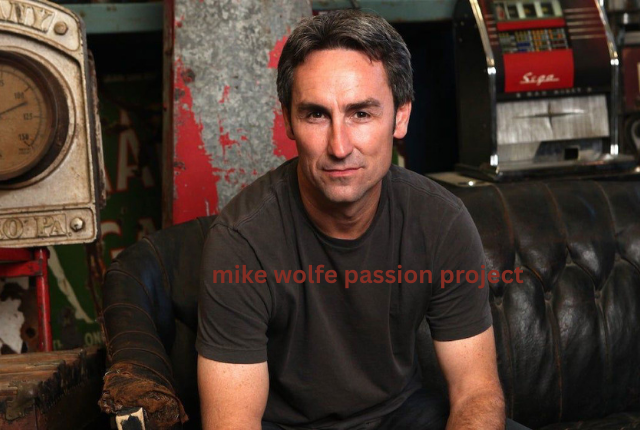Mike Wolfe Passion Project Reviving America’s Heartland in 2025

Having the name Mike Wolfe passion project brings to most people American Pickers, the hit series of History channel where Wolfe and his team of treasure seekers travel around America in search of lost treasures. The show has earned him the status of household name with accolades of possessing rare antique eyes and his ability to find value in what many have ignored over the years. But behind the television Wolfe, there is still an interior component. His passion project search is what he wants to do, as it touches his love of history, design and storytelling. The article also goes into depth about the definition and importance of the Mike Wolfe passion project, its motivations, and how the larger vision is all about creativity, preservation and cultural appreciation.
Table of contents
The Person behind the Vision
Even the family that brought Mike Wolfe the passion project did not see any value in what would be considered as trash. He started to go to old sheds, garages and barns and enjoy the experience as a child. It was a question not so much of resale value, but of tales, and historical life. When American Pickers first aired in 2010, viewers were enamored with the theme and passion project of Mike Wolfe, who wanted to go beyond rotten antiques. It was of persons, narratives, and connections. He uses the same mentality towards his passion projects.
What is the Mike Wolfe Passion Project?
In its essence the whole Midwestern-man story by mike wolfe passion project is about preservation, yet it is not the continuous preservation of antiques only. Wolfe is allied with the view that it is his responsibility to be a custodian of history- somebody who does not only buy and sell goods but also invents a sense of memory that is culturally rich. His initiative is about reviving the dead buildings, items and even societies. Be it the restoration of historical motorcycles, historic buildings repurposed in the town of his origin (LeClaire, Iowa), or a leadership role in preservation in Tennessee (Columbia), Wolfe shares a passion project that stems less out of a purely economic investment, and more out of a strong sense of heritage. To him all objects and all buildings have a history to be rewritten.
Columbia, Tennessee as Living Laboratory
- Columbia, Tennessee, is one of the clearest demonstrations of mike wolfe passion project.
- Once he relocated there, he invested in maintaining old buildings and creating places where culture and history come alive.
- When Wolfe turns vacant areas into business and community centers, he preserves existing structures and revitalizes local economy as well. The work Wolfe did in Columbia shows his project’s ideology: respecting the past and making it a present, tangible reality.
My second play called Always American Pickers:
A Creative Outlet (this play will be follow up to the first and therefore has no need of a synopsis). Even though television made Wolfe famous, it also assigned him into a character: the picker. His passion project enables him to transcend outside that label, to demonstrate him as an entrepreneur in creativity and preservation.
This includes:
- His interests in vintage cars and motorcycles and restoring them, which is a life-long hobby of mike wolfe passion project.
- He learned and applied architecture, especially building refurbishment, breathing new life into old buildings without destroying their spirit.
- Storytelling appears through his media personality on TV, books, social media, and personal appearances, engaging diverse audiences effectively.
- A passion project focuses on fulfilling creative self-expression and leaving a cultural impact, not on gaining fame or ratings.
Why mike wolfe passion project are Important ?
In a big business, profit-maximizing world, passion projects allow us a reminder of the importance of doing something based on its significance rather than its potential to be bought and sold. To mike wolfe passion project, this is his own personal purpose- his own impetus to continue digging, building, and creating. His narrative is relatable in that even a person that has acquired popularity and wealth still feels the need to gain even more meaning. It’s not what he owns, but what he contributes to heritage and preservation that truly matters in his work.
Some of the lessons that Mike Wolfe learned in his passion project
The Mike Wolfe passion project offers valuable lessons for anyone engaged in creative or professional work, emphasizing dedication, and impact.
- Trust your passions: mike wolfe passion project developed an interest in abandoned things at a very young age and this interest became the source of his career and passion in life.
- Save what counts: Not everything has to be new, sometimes what has already been built, is of utmost importance.
- Think outside money 
: American Pickers brought with it financial…
- Invest in your community: As his rehabilitation of the city of Columbia, Tennessee, demonstrates, you can have a long-term effect on people that can lead to a significant social change.
The Greater Cultural Influence
Passion projects such as those of Wolfe are not just personal gratification; they have an echo effect in the community, industries and even the entertainment world. His writings encourage other people to have alternative thoughts about the past-not that it is enclosed in museums and left to die but that it is an actual and living process carried out on a day-to-day basis. Through giving an example of relatability in preservation, Wolfe has contributed to changing the view of the masses. Weathered old barns, rusted motorbikes, and worn storefronts stand not as eyesores but as affirmations of life and remembrances.
Challenges on Feb 29
Naturally, passion projects are not always a piece of cake. Wolfe has already made known accounts of the hardship of managing business requirements, individual life, and creative work. Renovation of ancient buildings or renovation of old motor vehicles is time consuming, costly, and necessitates patience. However, these problems also provide satisfaction because of the resulting success. His perseverance shows that passion demands dedication beyond convenience, even when outcomes remain uncertain.
Impact on the real world of the Mike Wolfe Passion Project
Columbia Motor Alley
In Columbia, Tennessee, Wolfe made an industrial strip he had turned into a coffee shop and studio mixed-use center. According to an article by Parade in 2025, it reopened in front of a million people, which increased tourism by a fifth. This demonstrates how preservation leads to economic growth among owners of small business entities. The Columbia Motor Alley is a one of a kind passion project of Mike Wolfe, who loves transportation and history and preservation. It revolves around an old Chevrolet dealership building built in 1947 and converted into a bike shop and cultural center. This exhibit honors America’s automotive heritage by displaying vintage cars, equipment, and artifacts that inspire people to appreciate and envision restoring lost historical sites.
LeClaire, Iowa: How to bring a small town back to life
Wolfe reproduces three 1880s storefronts in LeClaire, where Antique Archaeology and a community workshop are located. The local business registered a 15 percent revenue growth in 2025 The Blup report to cope with the rural region’s falling economy. LeClaire, Iowa, is not only the hometown of Mike Wolfe, but also a center of a living revival. Because of his interest in history and antiques, Wolfe has played a critical role in making the Main Street of LeClaire a thriving Americana shopping center. He is not content with just his famous Antique Archaeology shop; he actively rebuilds ancient buildings and makes community proud. Wolfe describes LeClaire as a destination where past and present unite, offering visitors a rich heritage experience of small-town America.
Two-lane artisan support
Mike Wolfe is a patron of artisans, the founder of Two Lanes, a festival of small-town craft and old-fashioned Americana. Two Lanes, inspired by Mike Wolfe’s 25 years exploring backroads, actively serves as a storytelling platform and lifestyle brand. Wolfe emphasizes makers, artists and builders that preserve traditional crafts, advocating hand-made leather products, re-purposed vintage furnishings, metalwork, denim, woodcrafts and re-purposed industrial designs. Two Lanes pairs consumers with creators who believe in slow, purpose-filled production over mass production, boosting creators’ customers 30%, according to 2025 Vogue Vocal analysis.
This gives strength to artisans who are facing competition in the market.
Conclusion
The Mike Wolfe passion project has managed to assemble talent, vision, and legacy well enough to say the least. Mike Wolfe’s passion project reveals the real Wolfe, distinct from his popular work on American Pickers. He began to work with antiques, as well as create a TV program, which assisted him in achieving his objectives of preserving history, telling stories, and creating a sense of community. Mike Wolfe’s passion project shows that personal happiness fuels large social benefits. He has invested in the renovation of our old structures and our cultural infrastructures.
FAQS
Q1: What is the core purpose of the Mike Wolfe passion project?
The Mike Wolfe passion project is centered on historic preservation, storytelling, and cultural appreciation. Beyond antiques, Wolfe focuses on restoring old buildings, revitalizing communities, and breathing life into forgotten items, ensuring history remains a living part of modern life.
Q2: How does the Mike Wolfe passion project differ from American Pickers?
While American Pickers showcases Wolfe’s talent for finding valuable antiques, the Mike Wolfe passion project goes further by emphasizing restoration, design, and community impact. It is less about television entertainment and more about personal fulfillment, heritage preservation, and cultural legacy.
Q3: Why is the Mike Wolfe passion project significant for communities like Columbia, Tennessee?
In Columbia, Tennessee, the Mike Wolfe passion project has transformed vacant buildings into thriving cultural and business hubs. By preserving architecture and creating spaces that stimulate local economies, Wolfe demonstrates how passion projects can shape communities while honoring their historical roots.




